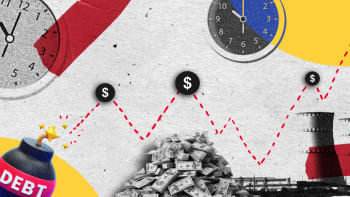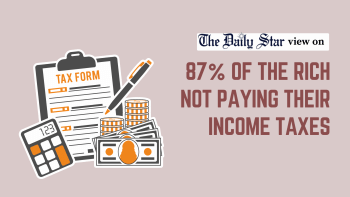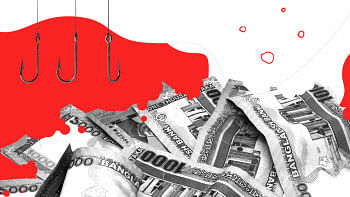Rising debt burden threatens our future

The continued increase in the government's debt burden amid insufficient revenue collection has emerged as a big concern. Despite public expenditure on development rising every year, the National Board of Revenue (NBR) has not been able to ramp up tax collection as much as the government had hoped for. Consequently, Bangladesh's tax-GDP ratio still stands below 10 percent, one of the worst in the world.
The ratio has not been good for the past two decades, which indicates how deeply rooted this problem is. Data from NBR and the finance ministry show that in the last 10 years, the amount of domestic and foreign loans has increased by 9 percentage points in proportion to the revenue collection of NBR. In other words, government borrowing has increased every year. In FY2013-14, the government reportedly had to borrow 44 percent of the amount that was the NBR's income. In FY2022-23, compared to the amount of money that NBR was able to collect, it was forced to borrow 53 percent more money to meet expenses. According to an IMF report, the amount of money Bangladesh has to spend on domestic and foreign debt interest payments is equal to 71.8 percent of revenue collection and grants. In the current fiscal year, that amount may increase to 101 percent, it said.
If a country has to spend the same amount (or more) that it earns as revenue to pay interest on debt, then it will have to borrow constantly to meet development and other expenses. Therefore, the government now finds itself in a tight spot. If it borrows from domestic sources, it will slow down investment (due to the crowding-out effect). But if it continues to borrow heavily from foreign sources, then it will lose foreign currency while paying interest. In FY2022-23, foreign loan repayment stood at $4.78 billion, up 32.8 percent year-on-year, according to the Economic Relations Division. And going forward, the repayments are expected to increase further.
So the only way out of this trap is to increase revenue collection. That should be more than possible if we can make the rich pay their taxes. Currently, an estimated 87 percent of rich and upper-middle-class people do not pay taxes, heavily contributing to the revenue and debt management problems. Therefore, it is high time the government reformed its tax collection system and ensured that the wealthy cannot continue avoiding taxes. Going forward, it should also think long-term about taking foreign debt.


 For all latest news, follow The Daily Star's Google News channel.
For all latest news, follow The Daily Star's Google News channel. 









Comments